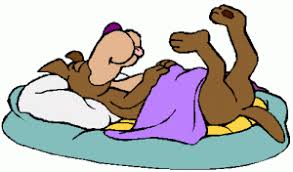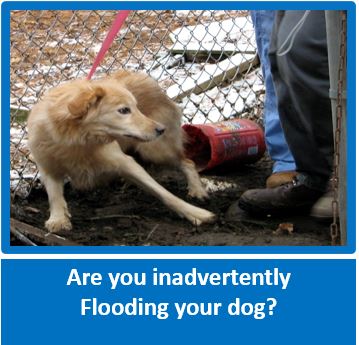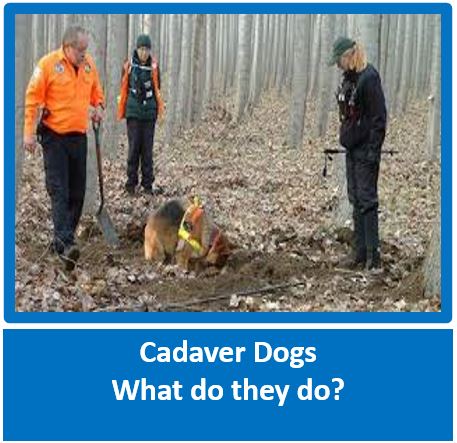Why Doesn’t My Dog... Sleep at Night?
Dr. Mary Becker
http://www.vetstreet.com
(really good resources)

I hear this a lot from my clients. Because when our dogs don’t sleep, we don’t sleep. They can keep us awake with loud scratching, pacing, whining or labored breathing. We either lie awake fuming — don't they know it's time to sleep? — or worrying — does this behavior warrant a trip to the veterinarian? Can it wait until morning? Or should we go right now?
Many conditions can cause a dog to be sleepless. Let’s look at some of the reasons and how you can deal with them.
Youthful Anxiety
Young puppies in new homes are experiencing huge changes in their lives. They’re away from their moms and littermates for the first time, living with new people in strange surroundings. No wonder they cry and whine or scratch to get out of their crates.
Nighttime is the right time for bonding with your dog, but that doesn’t mean he should be in bed with you. A puppy of this age is too young to sleep with you, much as you both might like it. He needs to learn some independence, while still gaining comfort from your presence.
Allergies and Skin Problems
Scratch, scratch, scratch. Is that the rhythm of your night? Itchiness caused by allergies or dry skin is another reason dogs scratch incessantly, keeping themselves and their owners awake.
Your dog may be suffering from environmental allergies, contact allergies, food allergies or dry skin caused by low humidity. Try laundering his bedding in detergent that doesn’t contain any dyes or fragrances. When you bathe him, make sure you use moisturizing shampoo and conditioner made for dogs. Set the blow dryer on warm, not hot. Pay attention to the surrounding environment. Is your heater on? A humidifier may help.
If none of these tips help, work with your veterinarian to determine what may be causing your pet's allergies. If your veterinarian suspects a food allergy, she may put your dog on an elimination diet, and then gradually reintroduce common ingredients to see if certain ones trigger that itchy behavior. Your veterinarian can also prescribe medications that can help beat the itch.
Pain and Other Problems
A dog who is restless at night may be in pain. Pacing and panting are other potential signs of pain or anxiety. A dog with these signs may be suffering from arthritis or other painful conditions.
Restlessness can also be a sign of canine heart disease. Dogs with greatly enlarged hearts may have trouble finding a comfortable position in which to sleep. Restlessness, coughing (especially at night) and labored breathing can signal congestive heart failure. Dogs who have trouble breathing should be taken to the veterinarian ASAP, even if it’s the middle of the night.
Many conditions can cause a dog to be sleepless. Let’s look at some of the reasons and how you can deal with them.
Youthful Anxiety
Young puppies in new homes are experiencing huge changes in their lives. They’re away from their moms and littermates for the first time, living with new people in strange surroundings. No wonder they cry and whine or scratch to get out of their crates.
Nighttime is the right time for bonding with your dog, but that doesn’t mean he should be in bed with you. A puppy of this age is too young to sleep with you, much as you both might like it. He needs to learn some independence, while still gaining comfort from your presence.
Allergies and Skin Problems
Scratch, scratch, scratch. Is that the rhythm of your night? Itchiness caused by allergies or dry skin is another reason dogs scratch incessantly, keeping themselves and their owners awake.
Your dog may be suffering from environmental allergies, contact allergies, food allergies or dry skin caused by low humidity. Try laundering his bedding in detergent that doesn’t contain any dyes or fragrances. When you bathe him, make sure you use moisturizing shampoo and conditioner made for dogs. Set the blow dryer on warm, not hot. Pay attention to the surrounding environment. Is your heater on? A humidifier may help.
If none of these tips help, work with your veterinarian to determine what may be causing your pet's allergies. If your veterinarian suspects a food allergy, she may put your dog on an elimination diet, and then gradually reintroduce common ingredients to see if certain ones trigger that itchy behavior. Your veterinarian can also prescribe medications that can help beat the itch.
Pain and Other Problems
A dog who is restless at night may be in pain. Pacing and panting are other potential signs of pain or anxiety. A dog with these signs may be suffering from arthritis or other painful conditions.
Restlessness can also be a sign of canine heart disease. Dogs with greatly enlarged hearts may have trouble finding a comfortable position in which to sleep. Restlessness, coughing (especially at night) and labored breathing can signal congestive heart failure. Dogs who have trouble breathing should be taken to the veterinarian ASAP, even if it’s the middle of the night.




